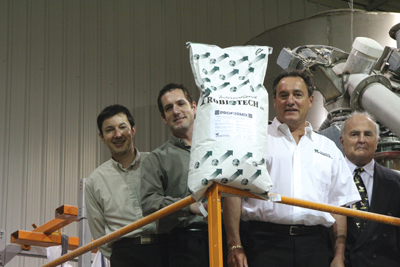
Probiotech International
By André Dumont
Features Production TurkeysRespecting animals, humans, and the environment
Many roads lead to the wonderful world of agriculture.
Many roads lead to the wonderful world of agriculture.
 |
| Probiotech’s R&D manager Ivan Girard, marketing manager Jean Babineau, president Guy Babineau and in-house veterinarian Louis Rolland. Advertisement
|
In 1989, Guy Babineau was in charge of yeast purchases at the Molson O’Keefe brewery in Montreal when a U.S., supplier approached him to develop the Canadian market for yeast used as probiotics in animal feed. Five years later, Babineau called in his brother Jean to replace him while he completed his MBA at the University of Ottawa. Jean Babineau held a bachelors degree in business administration and was working as a flight attendant. His employer, Nationair, had just gone bankrupt.
At that time, probiotics were the hottest new thing in animal feed. Probiotech had already made a name for itself by using live yeast extracts, which could be effectively used in lower doses than extracts made from dead yeast.
A third shareholder joined the Saint-Hyacinthe-based company in 2000, and Probiotech International was created. Born in France, Ivan Girard held a PhD in nutrition and microbiology from the University of Kentucky. He also had work experience in Europe, where demand for antibiotic-free meat was already strong.
In 2003, Probiotech International built a 10,000-square-foot facility in Saint-Hyacinthe’s new agri-food industrial park. The building houses a warehouse, mixing units, a lab and offices. Guy Babineau is president, Jean Babineau is marketing manager, and Ivan Girard is manager of research and development.Eight people currently work full time for Probiotech, and the company offers feed additives for poultry, dairy and swine production, as well as for petfood.
Among senior staff is also veterinarian Louis Rolland, who came out of retirement after gathering new knowledge about plant extracts.
“The most important thing is to develop feed programs that respect animals, humans and the environment,” Rolland says.
Don’t get them wrong: Probiotech staffs are highly convinced of the value of their products, but they are no hard-core believers in organics or small-scale “back-to-the-earth” farming. They feel that their feed additives simply offer an alternate way for achieving successful intensive production.
“Chicken was not made to be raised in lots of 30,000 with one square foot per head,” Rolland admits. “But if we want to feed the population, we don’t have a choice.”
Probiotech is the Canadian distributor of a half-dozen international suppliers. The company mixes 30 per cent of its products on-site, namely acidifiers. All products have been tested and documented, in Canada or abroad.
The range of products they offer to reinforce an animal’s digestive is wide: plant- and spice-extract-based natural appetizing agents, chelated minerals, active or dead yeast supplements and live lactic acid bacteria. Other products may be used to control ammonia concentration in barn air, or to control pests like darkling beetle, without using chemicals.
Clients are mostly private or co-operative feed mills that mix Probiotech’s additives into their feeds.
Future Growth
Farmers’ resistance to change is a big obstacle to Probiotech’s development, Girard admits. So is consumer demand.Canadians are much more concerned with the price than the quality of their food, he says. “If meat processors and marketers have no market for a healthier chicken, there’s no point asking farmers to change their methods.”
Probiotech expects demand for antibiotic-free chicken to be created by major buyers like St-Hubert BBQ chicken restaurants, or supermarket chains that will want to attract consumers with higher-quality meats.
“Those who use our products really believe in them, but they still represent a niche market,” Girard says.
If one day food regulation changes or a major buyer says he wants chicken raised with alternate feed additives, Probiotech will be ready, Girard says. And with more than 20 years of experience, says Guy Babineau, “we have a very good head start.”
Print this page